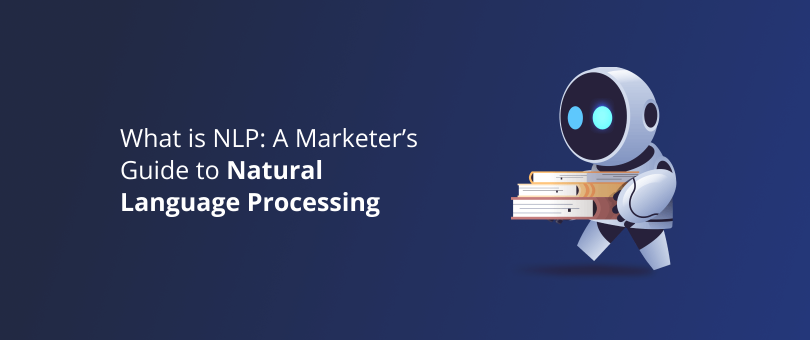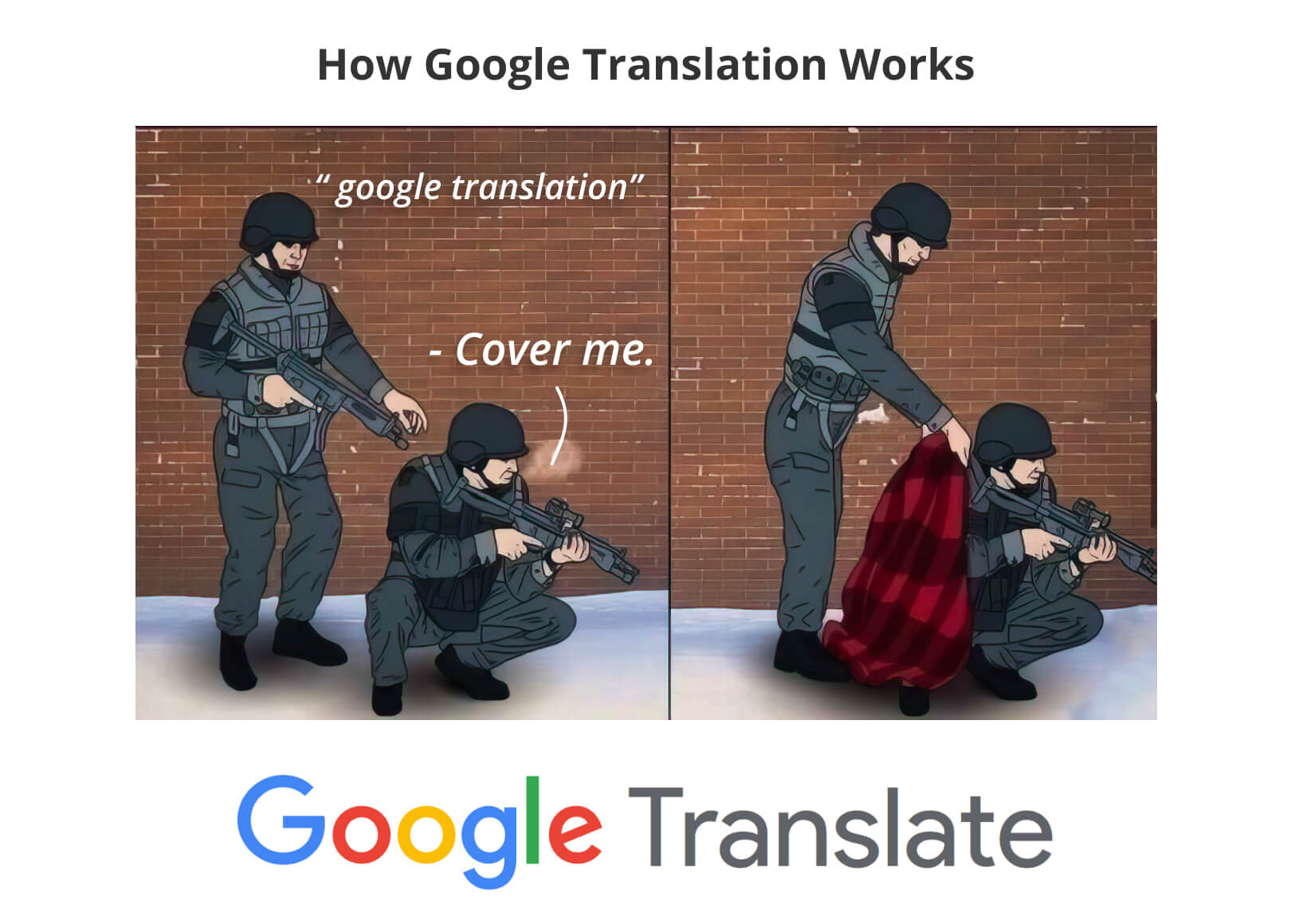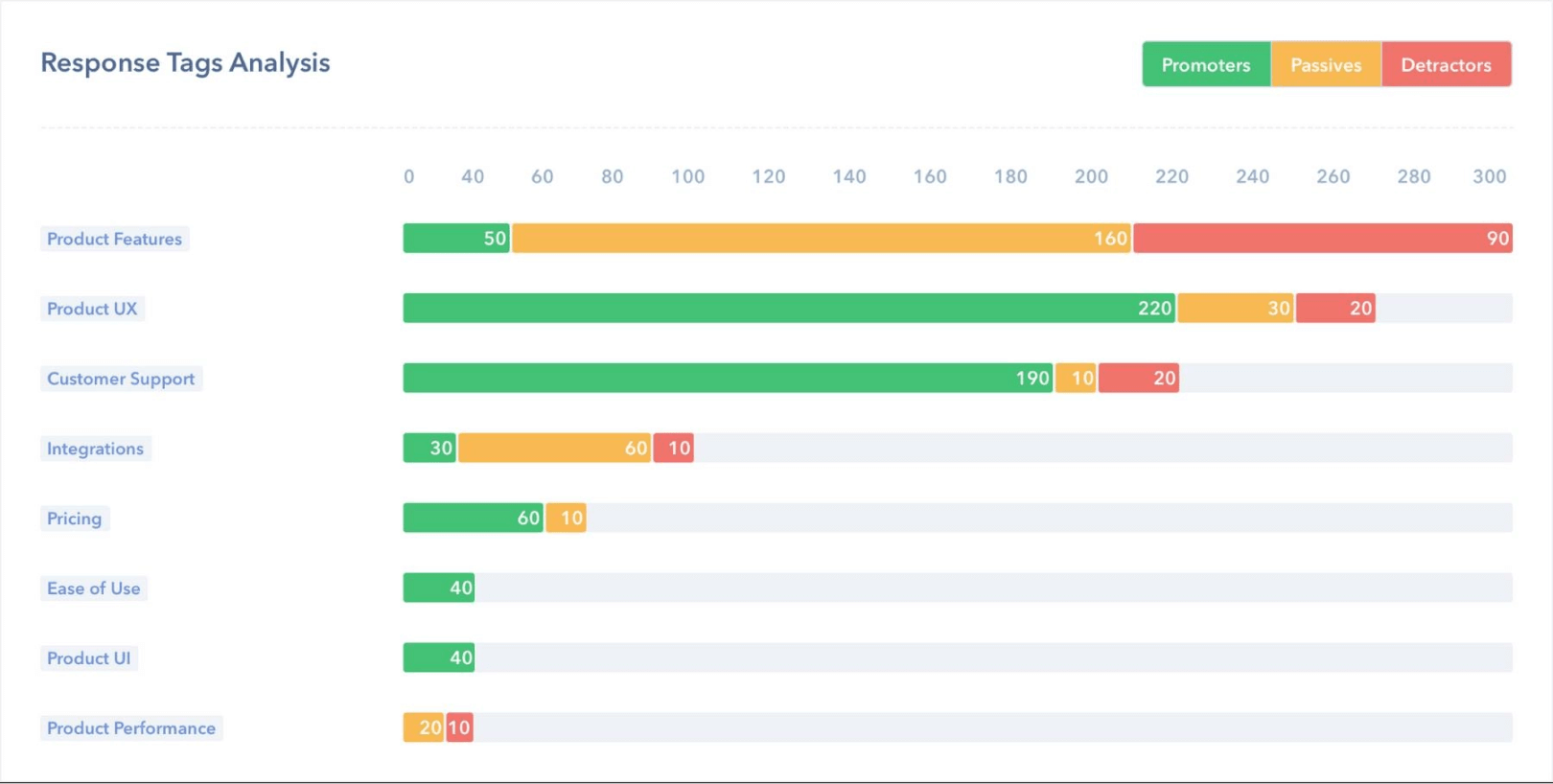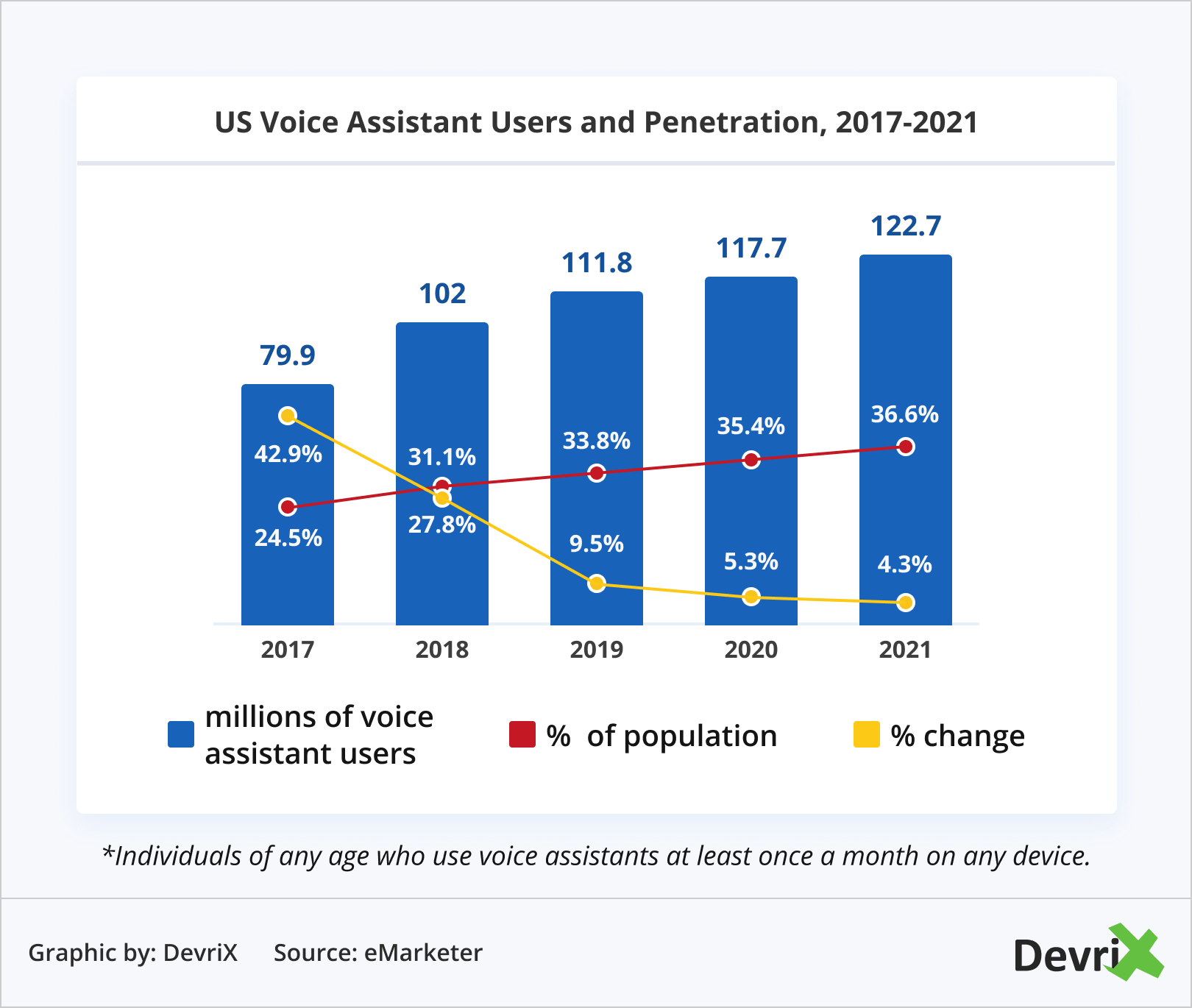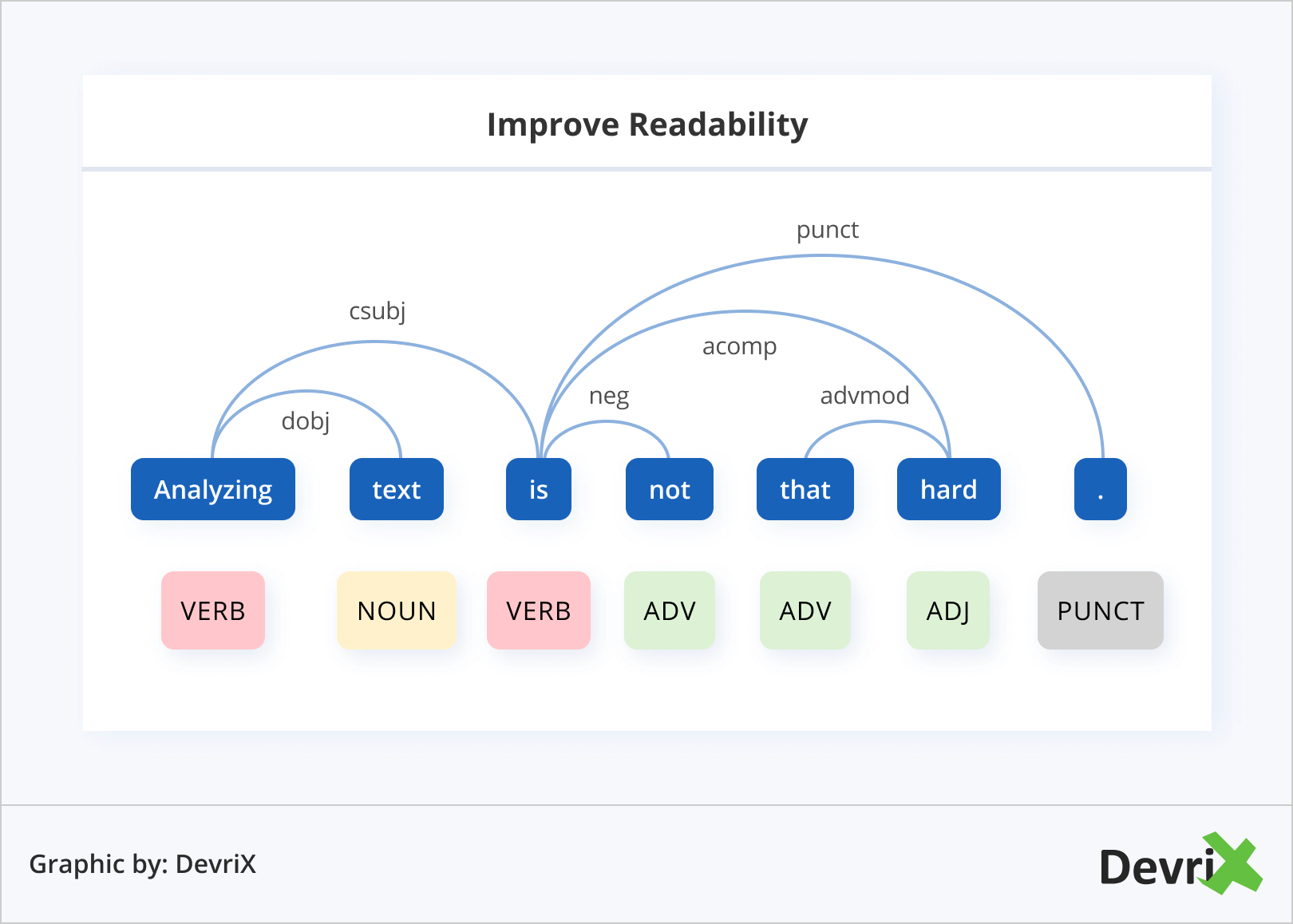Technology is one of the driving forces behind progress. Computers and digital tech make our personal and business lives easier, by enabling us to manage complicated tasks, communicate, discover the world around us, and push even further progress.
However, we all know the frustration when a tool or program we are using doesn’t “understand” us. We provide a seemingly simple command and expect a certain result, but it fails to deliver. One of the reasons this happens is because computers don’t think the way humans do, and vice versa.
The technology that attempts to build a bridge between the two is called natural language processing (NLP) and is a combination of linguistics and computing.
In this article, we discuss the applications of NLP in digital marketing and search engine optimization, and what marketers need to know. Read on to learn more!
What Is NLP?
Natural language processing (NLP) is a subset of artificial intelligence (AI) that uses machine learning (ML) and deep learning to process and understand human language. Or, simply put, NLP teaches computers to speak human.
The technology allows machines to distinguish the words in human speech and text, and analyze the context to figure out their proper meaning. Based on this data, they can identify sentiment, generate meaningful text, simulate conversation, translate information from one language to another, etc.
While NLP originated as a discipline in computing in the 1950s, it has only recently become advanced enough to be useful.
Teaching computer algorithms to think like humans is a complicated task. Language is a living thing and speech patterns and peculiarities are unique for every human. Learning a language requires an understanding of vocabulary, grammar, semantics, syntax, and so on. Furthermore, it also involves a general understanding of the world.
That’s what makes it tough for humans, and even more complex for computers.
For years, to communicate a task to a computer, people had to learn its language. However, while this isn’t easy, it also constrained the democratization of technology and limited its development potential. That’s why people decided to teach computers to understand us and started working on NLP algorithms.
With the advance of AI and ML came breakthroughs in the field that made possible long-awaited opportunities to apply NLP in the different aspects of science, business, and life. The discipline is still evolving and has a long way to go before computers fully understand humans. First, scientists have to find a way around complex linguistic factors such as dialects, pronunciation differences, speech defects, grammatical mistakes, and sarcasm.
However, natural language processing is now advanced enough to be beneficial for many industries, including marketing.
Applications of NLP in Digital Marketing
At its core, digital marketing relies on combining the power of linguistics and the opportunities digital tech provides. The goal of marketing is to conceive a compelling message, combine it with appealing visuals, and use it to attract customers. So, naturally, digital marketing and NLP are tightly connected.
Some of the more notable applications of the tech that we encounter in our day-to-day are:
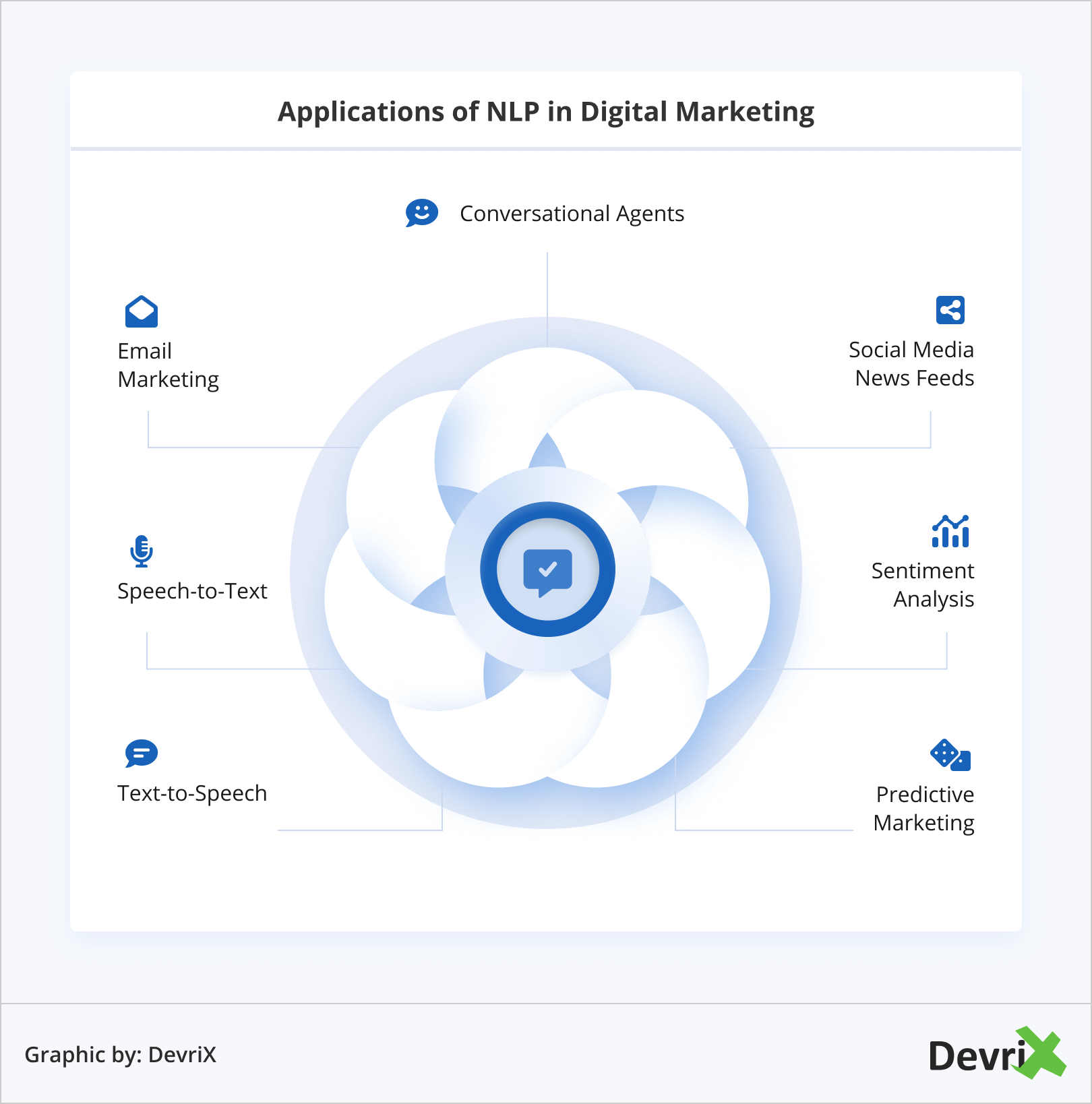
- Conversational Agents. Advanced chatbots use NLP to figure out what the customer wants and provide relevant answers. They can also be trained to maintain a human-like conversation, solve complicated problems, provide product suggestions, and even make jokes.
- Social Media News Feeds. NLP analyzes and sorts out content to show it to users. The keywords in the posts and links tell the algorithm what they are about and it decides who to show them to, depending on the user’s interests and other factors. That’s why social media posts need to be as well optimized for SEO as blogs and articles.
- Sentiment Analysis. There are SaaS tools that use NLP to analyze what customers are saying in order to identify how they feel about a brand or a product. Algorithms can analyze social media comments, NPS results, customer service tickets, online reviews, and all kinds of other unstructured data to derive comprehensive results.
- Predictive Marketing. NLP can be used in predictive marketing to spot emerging trends, as well as patterns that indicate a person is about to make a purchase, leave a brand, or do another relevant action.
- Text-to-Speech. The advancement of NLP technology makes the computer-generated voice sound natural and convincing enough to be pleasing to listen to. Marketers can use a variety of paid and free tools to effortlessly convert blogs and articles to audio files and podcasts.
- Speech-to-Text. Transcriptions of podcasts and videos make information more understandable to search engines, and more accessible to users. They also provide a richer UX that can boost your ranking.
- Email Marketing. Google’s algorithms analyze the keywords in emails to categorize them and label them in the user’s inbox. That’s one of the criteria they use to choose if a message should go in the Primary, Promotional, Social, or Spam folders.
However, one of the most prominent applications of NLP in digital marketing is in search engine optimization.
How Does Natural Language Processing Affect SEO
Google is constantly working on improving its natural language processing algorithm’s ability to better understand humans, and the 2019 BERT update was a step closer to that success. The program is now better at analyzing text structure, making connections between subjects, and identifying entities based on context.
NLP enables the algorithm to figure out the topic of content, relying not only on the keywords but on the overall meaning of the text. As a result, search engine bots are better at crawling and indexing the web. In addition, the search algorithm is now able to show relevant links even when faced with a completely unfamiliar query.
These improvements made it possible for the search engine company to raise its content quality standards and introduce the EAT regulations as a ranking factor.
However, for webmasters and content creators who write for humans and not only for robots, this shouldn’t be an issue. On the contrary, it means that they can focus less on the specific keywords and more on delivering valuable informative content that is relevant to the topic.
That said, let’s have a look at some of the notable ways NLP affects SEO.
- Search Intent. The algorithm is now capable of better distinguishing between navigational, informational, commercial, and transactional intent. It can analyze both the user’s query and the page’s content in order to identify whether their intent matches and deliver more accurate SERPs.
- Voice Search. Voice assistants have already become a regular part of everyday life for 33.8% of people in the US. Verbal searches are more complex and use natural language, as opposed to written ones, where users usually rely on keywords. NLP makes it possible that Alexa, Google Assistant, Cortana, and Siri can figure out what people ask them and provide relevant answers.
- Long-Tail Keywords. NLP is better at tracking long-tail keywords and correlating them with topics and entities (people, things, places, names, etc.) Therefore, even if it doesn’t have enough historical data in its knowledge base to find a perfect match for the user query, it can deliver close enough suggestions.
- Spam Detection. Search engines want to provide quality content and NLP algorithms allow them to identify spam of harmful pages, articles with click-bait or misleading headlines, hate speech, and so on. Such links are filtered out of the SERPs to provide a better UX.
- Title Tags. The search algorithm may extract excerpts of the content on a page to provide a different title that will better match the user’s intent. This way, even if the title tag provided by the webmaster is not clear or relevant if the content is, it may still reach its target audience.
How to Optimize Content for NLP
As mentioned, if you are already writing high-quality informational content, you should be on the safe side and don’t need to optimize any further. However, there are a few things that you should pay attention to in order to make it easier on NLP algorithms.
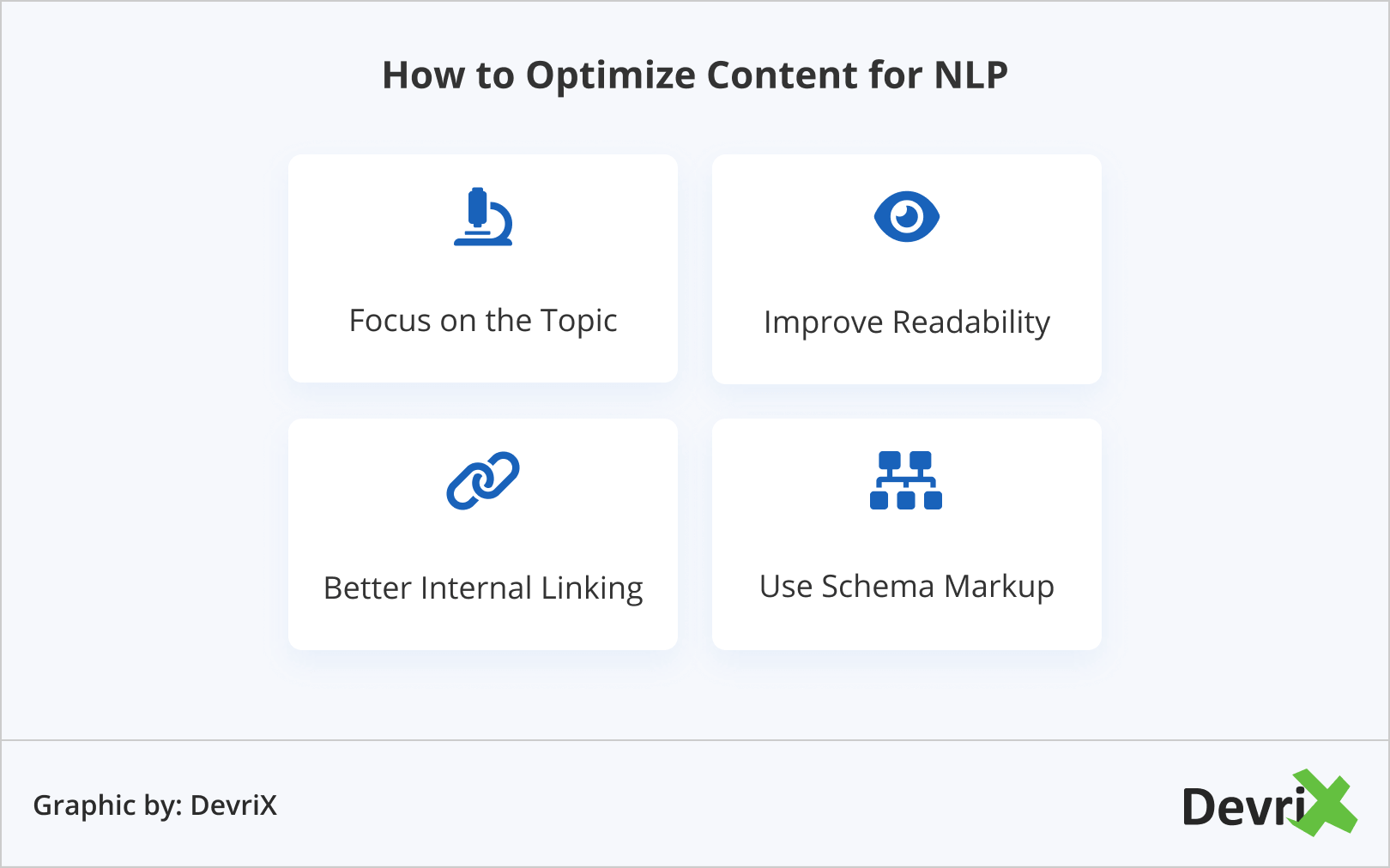
Focus on the Topic
Similarly to humans, robots love content that sticks to the topic. That’s because they understand words and notions by referencing their knowledge graph, and in it, entities are explained by their logical connections to other entities. If your content strays from that logic, the algorithm may become confused.
When covering a topic, make sure to research other relevant subjects and mention them in your content. This will help the robots see the full picture, and will also show them that you know the topic well.
Improve Readability
Simplicity in phrasing, vocabulary, and syntax makes text easier to analyze. NLP uses tags to label the words in a sentence in order to mark what function they have and how they are related. If your sentences are too long and complicated the algorithm may become confused. To avoid this, make sure that you express ideas in a clear and concise way.
Furthermore, you should abstain from overusing slang, professional language, or unnecessary remarks, as these may create further confusion.
Focus on shorter paragraphs with an easy to follow text structure by using relevant H2 and H3 titles, and bullets. This will make it easier for the algorithm to pin down the subtopics you are covering and how they are related to the main one.
Better Internal Linking
Internal links provide additional context to your content and help the algorithm figure out how a page is related to the rest of the content on your website.
In addition, referring to articles that explain subtopics in further detail, will eliminate any confusion about your topic. Internal links give the NLP algorithm confidence that it’s following your logic properly and is not misinterpreting the meaning behind words.
Use Schema Markup
While NLP software is supposed to be able to extract all the viable information from the text on its own, giving it a hand won’t hurt. As mentioned, the technology is still far from perfect. The more data it has to work with, the better it performs. And structured data is organized exactly the way the algorithm needs it in order to process and understand a page.
By giving it a head start, you make sure that it will know what it’s dealing with and will have a roadmap to figuring out your content.
Bottom Line
Natural language processing has become an inseparable part of digital marketing and search engine optimization. Google’s search algorithm relies heavily on the tech to improve the accuracy of SERPs, and many other tools that we use in our day-to-day also benefit from it as well.
By knowing how NLP works and what its limitations are, marketers and webmasters can improve their general understanding of digital technology and online search. Leveraging this knowledge, they can better optimize the content they create and improve their overall digital strategy.
